RECOMMENDED
A pair of sensational performances by Sienna Farall as Maggie and Brian Robert Harris as Big Daddy elevate Theatre Palisades’ revival of Tennessee Williams Cat On A Hot Tin Roof above standard community theater fare.
Williams’ 1955 drama unfolds in real time over the course of a single evening at the Mississippi plantation home of “Big Daddy” Pollitt (Harris), a multimillionaire tycoon who has recently undergone a battery of tests to determine the nature of some pretty darned painful abdominal pains.
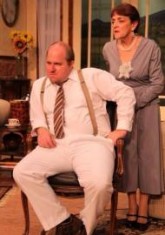 To his great relief, doctors have informed Big Daddy and his wife “Big Mama” (Joanna Churgin) that it’s nothing but a spastic colon; in fact, the patriarch is suffering from incurable, inoperable cancer, and is unlikely to live all that much longer.
To his great relief, doctors have informed Big Daddy and his wife “Big Mama” (Joanna Churgin) that it’s nothing but a spastic colon; in fact, the patriarch is suffering from incurable, inoperable cancer, and is unlikely to live all that much longer.
Big Daddy’s family has gathered together this evening to celebrate his 65th birthday and later, when the time is right, to break the news of Big Daddy’s actual condition to Big Mama, who will be needing the support of Big Daddy’s and her two sons now more than ever.
There’s older son, successful businessman Gooper (Michael Willens), aka “Brother Man,” married to “Sister Woman” Mae (Maria O’Connor) with a gaggle of bratty children in tow and another on the way.
There’s also younger son Brick (Ted Detwiler), a local TV sportscaster unable to forget his past glories as a high school football star, or (more significantly) his deceased best friend Skipper.
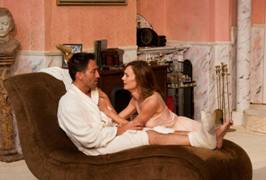 Brick, too, is married, but unlike Goober and Mae, he and Maggie (Farral) are childless, leaving his wife feeling like a “cat on a hot tin roof” in more ways than one as her husband spends his nights imbibing drink after drink in order to feel the “click” that will make being alive bearable.
Brick, too, is married, but unlike Goober and Mae, he and Maggie (Farral) are childless, leaving his wife feeling like a “cat on a hot tin roof” in more ways than one as her husband spends his nights imbibing drink after drink in order to feel the “click” that will make being alive bearable.
If Brick hasn’t been showing Maggie a good time in bed recently, the most likely cause would seem to be guilt over the suicide of longtime best friend Skipper and resentment for his wife’s possible role in his death, if not still-repressed sexual longings for his high school football buddy.
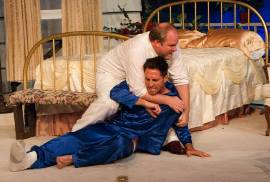 Williams himself is said to have supported the former point of view, though many if not most have assumed the accuracy of both Maggie’s and Big Daddy’s assertions that Brick desired more than friendship from Skipper, the explicitness of their accusations showing how far ahead of Hollywood 1950s Broadway was in its depiction of “sensitive” subject matter.
Williams himself is said to have supported the former point of view, though many if not most have assumed the accuracy of both Maggie’s and Big Daddy’s assertions that Brick desired more than friendship from Skipper, the explicitness of their accusations showing how far ahead of Hollywood 1950s Broadway was in its depiction of “sensitive” subject matter.
Take these lines from the script as first published in 1958: “You think me an’ Skipper did, did, did—sodomy—together? You think Skipper an’ me were … a couple of … queers?” I repeat, these words come from the 1950s Cat and not from its presumably more explicit 1974 Broadway rewrite.
In other words, those whose only familiarity with Cat On A Hot Tin Roof is from Richard Brooks’ sanitized, de-homosexualized 1958 film adaptation, shot at the height of the MPAA Production Code, will be surprised at how truly adult Williams’ script is, even in its Elia Kazan-directed Broadway form.
Setting Theatre Palisades’ production apart from any Cat On A Hot Tin Roof revivals Angelinos have been offered over the past decade is the opportunity it offers to see not the revised text of the 1970s revival, but Williams’ original, pre-Kazan script, the biggest difference being that Big Daddy remains offstage throughout the play’s final act. (His Kazan-dictated Act Three return always did seem to defy dramatic reason when you get right down to it.)
Directed by Michael-Anthony Nozzi, Theatre Palisades’ Cat On A Hot Tin Roof revival is blessed by a pair of performances that could easily be found on any professional theater stage.
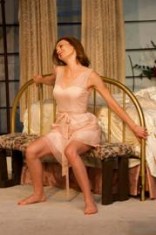 Since Act One is a virtual monolog for Maggie The Cat (with Brick only occasionally interrupting the rants, pleas, and accusations of his frustrated wife), and since Act Two belongs almost entirely to Big Daddy at his most frighteningly bombastic, the presence of Farall (as talented as she is gorgeous, seductive … and fiery as any cat on a hot tin roof could be) and Harris (as Mississippi-hurricane-explosive a Big Daddy as you’d ever hope to see, despite a two-decade-or-so age difference between character and actor) is inestimable.
Since Act One is a virtual monolog for Maggie The Cat (with Brick only occasionally interrupting the rants, pleas, and accusations of his frustrated wife), and since Act Two belongs almost entirely to Big Daddy at his most frighteningly bombastic, the presence of Farall (as talented as she is gorgeous, seductive … and fiery as any cat on a hot tin roof could be) and Harris (as Mississippi-hurricane-explosive a Big Daddy as you’d ever hope to see, despite a two-decade-or-so age difference between character and actor) is inestimable.
Leading man Detwiler is quite good as revealing what’s going on beneath the surface of the frustratingly passive Brick, though his vowels seem more Midwest than Deep South.
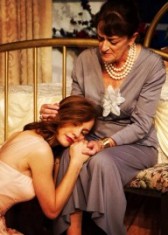 Churgin has some powerful Big Mama moments, but it’s hard to imagine the gutsy, gritty Best Actress Scenie-winner being cowed by anyone, even Big Daddy.
Churgin has some powerful Big Mama moments, but it’s hard to imagine the gutsy, gritty Best Actress Scenie-winner being cowed by anyone, even Big Daddy.
O’Connor’s broadly-drawn Mae seems out of place beside her more nuanced castmates and Willens’ Gooper comes across rather too wimpy to have fathered five no-necked monsters with a sixth on the way.
Director Nozzi has a nicely-rendered cameo as Doctor Bough, but Peter Miller’s Reverend Toker could benefit from a more expressive delivery. Ryanna Rowles (alternating with big sis Makayla) is a cute, perky Dixie Pollitt (and has quite a lovely neck).
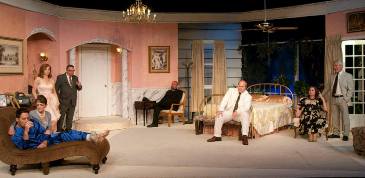 Nozzi’s carefully detailed set (including a functioning 1950s TV console) is top-drawer for community theater, allowing us both inside Brick and Maggie’s room and outside as well, with additional kudos to cast member O’Connor for her multiple props. June Lissandrello gets top marks for the production’s spiffy period costumes. Andrew Frew proves a capable lighting designer. Sound designer Susan Stangl gives us the requisite effects (fireworks, thunder, party noises, etc.) but many of them are jarringly sound-on, sound-off.
Nozzi’s carefully detailed set (including a functioning 1950s TV console) is top-drawer for community theater, allowing us both inside Brick and Maggie’s room and outside as well, with additional kudos to cast member O’Connor for her multiple props. June Lissandrello gets top marks for the production’s spiffy period costumes. Andrew Frew proves a capable lighting designer. Sound designer Susan Stangl gives us the requisite effects (fireworks, thunder, party noises, etc.) but many of them are jarringly sound-on, sound-off.
Cat On A Hot Tin Roof is produced by Martha Hunter and Sherman Wayne.
Golden Era theater aficionados will appreciate Theatre Palisades’ decision to preserve Williams original three-act/two-intermission structure, and though the play runs close to three hours, it is neither tedious or slow-moving, and when either Farall or Harris take centerstage, this Cat On A Hot Tin Roof takes fire indeed.
Theatre Palisades, 941 Temescal Canyon Rd., Pacific Palisades.
www.theatrepalisades.com
Tags: Cat On A Hot Tin Roof, Los Angeles Theater Review, Tennessee Williams, Theatre Palisades


 Since 2007, Steven Stanley's StageSceneLA.com has spotlighted the best in Southern California theater via reviews, interviews, and its annual StageSceneLA Scenies.
Since 2007, Steven Stanley's StageSceneLA.com has spotlighted the best in Southern California theater via reviews, interviews, and its annual StageSceneLA Scenies.







 COPYRIGHT 2024 STEVEN STANLEY :: DESIGN BY
COPYRIGHT 2024 STEVEN STANLEY :: DESIGN BY